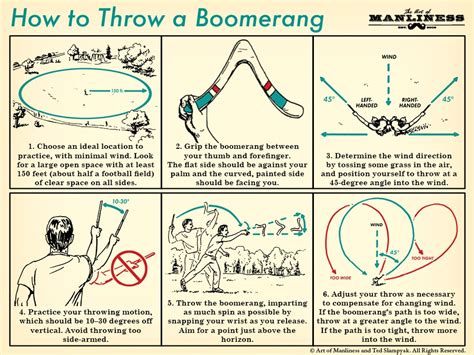How To Throw A Boomerang: A Beginner's Guide to Aerial Acrobatics
Throwing a boomerang might seem like a mystical skill reserved for Australian aboriginals, but it's a fun and surprisingly accessible activity anyone can learn! This guide will teach you the basics, from choosing the right boomerang to mastering the perfect throw. Let's get started on your journey to boomerang mastery!
Choosing Your First Boomerang
The key to a successful boomerang experience is selecting the right tool. Don't grab just any boomerang off the shelf – consider these factors:
- Size and Weight: Beginners should opt for larger, heavier boomerangs. These are more stable in flight and easier to control. Smaller, lighter boomerangs are better suited for experienced throwers.
- Material: Most beginner boomerangs are made from durable plastic. These are less likely to break upon impact (which, let's be honest, will probably happen a few times!).
- Type: There are many types of boomerangs, but for beginners, a returning boomerang is the obvious choice. These are designed to return to the thrower after a flight. Avoid trick boomerangs or hunting boomerangs until you've mastered the basics.
Mastering the Perfect Throw: Technique and Practice
Throwing a boomerang effectively involves more than just a casual toss. Follow these steps for optimal results:
1. The Grip: Finding Your Hold
Hold the boomerang firmly, but not too tightly, by its wingtip. Your grip should be relaxed yet secure. Experiment to find the grip that feels most natural to you.
2. The Stance: Positioning for Success
Stand with your feet shoulder-width apart, facing into the wind (a slight breeze is helpful for beginners). Keep your body relaxed and balanced. Avoid stiffening up – a natural, fluid motion is essential.
3. The Throw: Underhand, Overhand, or Sidearm?
The most common and effective throw for beginners is an underhand throw. Hold the boomerang with the concave side facing upwards. Bring your arm back as if you were throwing an underhand softball, then unleash the boomerang with a smooth, swift motion, aiming slightly downward. Avoid throwing too hard – a gentle, controlled throw is preferable. Experiment with slight variations in angle until you find what works best.
4. Practice Makes Perfect: Persistence and Patience
Don't expect to become a boomerang expert overnight. Practice regularly in an open space, free from obstacles. Each throw provides valuable feedback, helping you refine your technique. Observe how the boomerang flies, noting the effects of different throwing angles and force.
Troubleshooting Common Problems
- Boomerang not returning: This is often due to insufficient power or an incorrect throwing angle. Try adding more power to your throw, or adjust your aiming angle. A slight downward angle is usually best for beginners.
- Boomerang crashing: This could be due to excessive power or a poor grip. Ensure your grip is relaxed and firm, and reduce the force of your throw.
- Boomerang flying erratically: This suggests an inconsistency in your throwing technique. Practice consistently to develop a smooth and consistent throwing motion.
Beyond the Basics: Advanced Techniques
Once you've mastered the basic underhand throw, you can explore more advanced techniques, including overhand throws, sidearm throws, and even tricks. However, these should only be attempted after you’ve completely mastered the basic throw.
Safety First!
Always throw your boomerang in a wide-open area, away from people, animals, and fragile objects. Be mindful of your surroundings and wear appropriate clothing to avoid injury.
By following these steps and dedicating time to practice, you’ll be throwing boomerangs like a pro in no time! Remember, patience and persistence are key. So grab your boomerang, head outdoors, and enjoy the flight!
